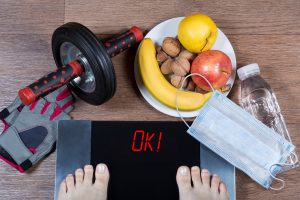
Studies have shown that ten lifestyle changes can be followed to help improve blood pressure. They are:
Control Weight
As weight increases, blood pressure often goes up. Taking control of your weight is one of the most effective lifestyle changes for lowering blood pressure. In general, it is possible to reduce blood pressure by about 1 mm Hg with each kilogram of lost weight. Besides just shedding pounds, take notice of your waistline. Carrying too much weight around the middle can put you at greater risk for high blood pressure.
Regular Exercise
Studies show that regular physical activity can lower blood pressure by about 5 to 8 mm Hg. 150 minutes a week or about 30 minutes a day is recommended. It is also essential to be consistent to keep blood pressure low.
Healthy Diet
By following a healthy diet rich in whole grains, fruit, vegetables, and low-fat dairy products, you can lower your blood pressure by up to 11 mm Hg. It isn’t easy to change eating habits, but by starting slowly and keeping a food diary, it can become second nature.
Reduce Sodium
The effect of sodium intake on blood pressure can vary among groups of people, but in general, most people benefit from cutting it from their diet. Even a small reduction of sodium can result in a reduction in high blood pressure.
Limit Alcohol
Alcohol is a tricky subject because it has been found to reduce and increase blood pressure. Moderation is key, so one drink a day for women and two for men can potentially lower blood pressure by about 4 mm Hg.
Quit Smoking
Quitting smoking can improve all aspects of health. But for blood pressure, it can help it return to normal levels, reducing your risk of heart disease.
Cut Caffeine
This is a highly debated subject among health professionals, but one fact is certain. For those who rarely consume it, caffeine can raise blood pressure up to 10 mm Hg. So, if you enjoy a cup of coffee from time to time, better opt for decaf.
Reduce Stress
Chronic stress has been found to contribute to high blood pressure. Take steps to reduce stress and remember that often, people react to stress by eating unhealthy foods, smoking, or drinking alcohol.
Monitor Blood Pressure
By investing in a home blood pressure monitoring device, you will keep tabs on your blood pressure to make certain your lifestyle changes are working.
Get Support
Family and friends’ support can go a long way to help keep you on track to lower your blood pressure. If you need support, consider joining a group that can put you in touch with people who can offer an emotional or morale boost.